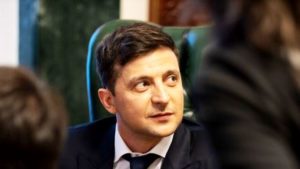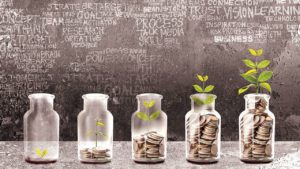
The voluntary restructuring of feed-in tariff in wind energy is possible subject to other market reforms, according to a letter from foreign developers of large wind farms, namely NBT, Windkraft Ukraine, LongWing Energy, Greenworx Holding and Akuo Energy, which was sent to President of Ukraine Volodymyr Zelensky in late October.
According to the document, the restructuring may concern new wind farms or expansion of existing facilities, which will be commissioned on the basis of preliminary electricity sale and purchase contracts signed by the end of 2019, with the exception of projects or their stages being under construction or already having a financing agreement.
As an example, wind farm developers are considering a 5.0–7.5% reduction in the feed-in tariff rate for the wind farm project portfolio with a capacity of 1.9 GW compared to the feed-in tariff defined for wind farms for 2020–2022 in exchange for extension of the term of electricity sales contracts up to 15 years from the date putting wind farms into commercial operation.
At the same time, the authors of the letter oppose retrospective changes in the renewable energy market, drawing the head of state’s attention to the fact that the consequences of this option will be the loss of about $2.5 billion of direct investment, as well as the exit from the sector of foreign investors. According to the companies’ estimates, foreign investment in wind energy has already reached $1.2 billion, and an additional $2.5 billion is planned for the next three years.
In their opinion, the consequences of any retrospective changes to the previously approved by the law schemes for supporting wind energy incentives will be more significant than the problem of financing Guaranteed Buyer state enterprise.

Christoph Leitl, the President of the Association of European Chambers of Commerce and Industry, which represents 20 million companies, spoke in an interview with the Interfax-Ukraine agency about the assessment of the prospects of cooperation between Ukrainian companies and European partners, Ukraine’s prospects of entering the European markets and the consequences of protectionism without increasing competitiveness. From 2000 to 2018, Christoph Leitl was also the head of the Austrian Federal Economic Chamber, and currently he is the Honorary President of the Chamber.
– What are your impressions of the meetings in Ukraine?
Ukraine is an important member of EUROCHAMBRES and Ukraine plays an important role in the European economic community.
Within the framework of our visit, Gabriele Haselsberger, the Austrian Trade Commissioner, organized a meeting of Austrian companies and their Ukrainian partners. A large number of companies gathered at this meeting, we also had contacts with representatives of the media e.g. with Ukrainian television. We had a meeting with the Mayor of Kyiv Vitaliy Klitschko, Deputy Prime Minister for European Integration Dmytro Kuleba and the Deputy Minister of Economy.
These contacts were very interesting, they testified to a new stage of cooperation. If we manage to implement what the new government announced, Ukraine will become more attractive to investors. This is interesting for all of us, not only for Ukraine, but also for the entire European Union.
– How do you assess the current potential of Ukraine? Which sectors of the Ukrainian economy are attractive for Austrian partners?
I understand that Ukraine is one of the most important agricultural hubs and occupies a leading position, in particular, in the IT-sector and metallurgy. This is very interesting, because we can talk not only about agriculture, which is certainly a very important sector for Ukraine. There are a lot of prospects in the agricultural sector, but it requires modernization. Ukraine today occupies a leading position in the agricultural sector at the global level, primarily due to the large amount of land, favorable climate.
– If we talk about the IT-industry, we have up to 300.000 IT-specialists in our country by some estimates. What does it mean for Ukraine and Europe?
These young specialists and Ukraine have a great future, because IT-specialists and their work is in demand everywhere. These 300.000 specialists can be the basis for Ukraine’s young generation to stay in the country and create here. Brain drain is a huge danger for Ukraine. We have already seen how it happens: Ukrainians move to Poland, Poles to Great Britain, and Great Britain leaves the EU (laughs).
This is not the right road. People should have a perspective in their own country. We must also build prospects for young people in Africa and Asia. If they have no prospects, what will they do? They will move towards Europe. No one will be able to hold back 20-30 million people, no walls on the borders and no bans.
But if we return to the prospects of Ukraine, I can say that it is not only IT, it is also infrastructure, energy efficiency, environmental protection, including the solution of the problem of waste, which is very important today, in particular, for Kyiv and other Ukrainian cities.
We are ready to share our experience in solving these and other problems. For example, Austria has a dual education system. This means combining school training with professional training at the enterprise: one day a week at school and four days at the enterprise, within three years, and at the end of the training specialists get a certificate that they are well-trained employees. We need good professionals because high quality is the most important issue in global competition. High quality of education, production and services makes us successful on the international market.
– What obstacles do you think Ukraine faces on the way of development?
It is not easy to evaluate another country, but I can give an example of investors from Austria, so that the Ukrainians could more objectively evaluate their way.

Austria, for example, is one of the top ten investors in Ukraine with more than 1 billion euros of investment. We invested in Ukraine from the very beginning, when we thought that Ukraine would be on the rise, but very soon political disputes and problems began. Those who had already invested in Ukraine remained, for example, Raiffeisen, but new investors did not come. They tell me: “Let’s see where the country will go, whether the country will choose the rule of law, whether it will say “no” to corruption, whether it will create favorable conditions for business in taxation and education. New investors will ask how well trained the staff in Ukraine is to maintain equipment or provide services. If Ukraine solves these problems, it has a great chance in the future. Now is the time to do concrete things.
– Ukraine is going through a difficult time, and there is still a military conflict in the east of the country. How does the presence of military conflict in our country affect business relations? Can business contribute to ending this conflict?
The economy can unite people, build trust and contribute to stability and peace. But the economy needs a stable political situation, so we would like this conflict to end. But we are aware of the fact that it is impossible to end it in one day. The exchange of prisoners is a very good symbol. A symbol of readiness to make a step towards each other. Potential investors are following the processes very closely. If dialogue continues, business can contribute, connect people and contribute to politics. In the long run, I see a free trade association from Lisbon to Vladivostok, including, of course, Ukraine. The economy can bring people closer together, and I am sure that politics will follow.
– Ukraine has a new president, a new government, a new parliament. Does the change of power hold back economic processes and investments?
We also have a new commission and a new parliament in the European Union.
This means a new start, now is a very good time for both you and us to accelerate investments.
I think that potential investors will come as soon as they understand that the fight against corruption, the rule of law, and business-friendly taxation has already been implemented in Ukraine, and they will understand that these are not only pre-election promises, but political reality.
– Are you a supporter of liberal economy, free trade or so-called healthy protectionism?
Protectionism leads to poverty. Wealth and prosperity are based on free trade. America has raised the flag of free trade since the Second World War, and this has given the world cooperation and prosperity. Now they have lowered the flag and are beginning to wage economic wars.
Certainly, some of the arguments of protectionism are true; first of all, that China is not as open and honest as it should be. But trade wars are not easy to win, they are detrimental not only to China and the United States, but also to other countries. This conflict has affected us all indirectly. We need free trade. After two decades of negotiations, we now have a free trade agreement with Japan, Singapore, Canada, a renewed agreement with Mexico, with Mercosur countries (the common market of South America, the economic and political agreement between Argentina, Brazil, Uruguay, Paraguay and Venezuela).
We must build a strategy with Africa, and build, as I said, a transcontinental free trade strategy. If we want to survive in global competition as Europeans, we have to cooperate. Ukraine has to be involved in this process, it is a part of Europe.
China is a challenge for the whole world, a challenge for all of us. If China is ready to work honestly, we welcome them. But we, Europeans, have to wake up and do what we have to do – unite our forces. Citizens of Ukraine are part of European culture and history. Together we can create innovations for new products and services and become more competitive.
– What other problems do you see in politics and economics? Some macroeconomists say that we are on the threshold of a new period of global economic wars and on the eve of the next financial crisis.
First of all, entrepreneurs should always be optimistic. Those who are afraid in this world have already lost. It does not mean not to see risks, there are risks in economic wars, in the financial sector, but we need a global dialogue to avoid these risks. The economy today is a network. Those politicians who think that by taking action they will win and the rest lose, will lose. The U.S. will soon feel the consequences of the war with China when China will introduce counter-tariffs. The time of single positioning has passed, whether someone likes it or not, but we all live in a multi-polar world.
I believe that the main challenge for humanity is climate! International institutions such as the G7 or G20 have to define some frameworks, including in the financial sphere and in the sphere of the impending climate crisis. We can only fight climate change at global level. No country can do this alone. In order to implement the Paris Agreement, steps and monitoring mechanisms need to be discussed at the G20 level. I would like to stress that we are not talking about world government, we are talking about global dialogue, understanding and agreements on some topics to move the world forward.
The financial system is international, and speculation is part of it. I have concerns about that. Everyone needs to pay taxes. It is not possible to justify that small players have to pay taxes and large ones have to go to tax-free islands. This is not fair competition. I am for free, but always for fair competition. Today we have to build global conditions to achieve justice.
– Some Ukrainian businesspersons do not consider the free trade agreement with the EU to be quite positive because Ukraine, in their opinion, has opened its market for European foodstuffs, beverages, and other goods, but our business cannot compete, for example, with wine producers in Italy and France without any state support from our winemakers. From their point of view, the state should provide sufficient support to some sectors of the economy to protect the market and Ukrainian producers.
What would you suggest to our government that we do not depart from the free trade agreement, but Ukrainian business could also compete with other countries?
Firstly, the wine in Ukraine is very tasty, I enjoyed it during my stay. In terms of quality it could compete with all wines of the world. And your food products are very tasty.
Secondly, in the EU it is impossible to provide permanent subsidies, and this should not be possible in other countries. Modernization of wine production is targeted at the EU, so modernization for better quality can also be subsidized in Ukraine, and it is not stated anywhere that such support is prohibited. This is normal to help modernise and help to obtain better quality, but there should be no subsidies for regular wine production. You need an organization for marketing. I see in airports around the world, not in Kiev, but in other airports I see wine from South Africa, Chile, France, Italy, not from Ukraine. This means that the sales network should be organized in a different way, more professionally in terms of supporting the national producer, perhaps under the aegis of the Ministry of Economy or a specialized state organization.
– Let’s switch to Austrian-Ukrainian relations: are there any companies now considering the possibility of entering the Ukrainian market?
As I said earlier, Austria is among the top 10 investors with more than 1 billion euros. This is Austria’s great trust in Ukraine. We have historical ties with Ukraine. We are proud of it.
In order to attract additional investors, you have to do what you said in the beginning: changes in key areas for business. The sooner you do this, the sooner potential investors will be interested in your country. There is a huge potential. Investors need to be sure that their investments are not threatened by uncertain environmental conditions.
Austrian companies already have about 250 subsidiaries here, including about 25 production companies, nobody wants to lose these investments, on the contrary, create conditions, the business will only increase investments.
– Another problem of the Ukrainian economy is its structure, Ukraine mainly exports raw materials (grain, metal), but not the finished product. How can Austrian and other international partners help to create processing enterprises for the production, including export, of high value-added products?
Ukrainians themselves should realize the need to create processing and production. Ukraine has an example before its eyes, it may be unpleasant for many, but it is a fact: Russia exported mainly raw materials, as a result of the sanctions Russia had to diversify the structure of the economy and now exports products with higher added value.
As I said, create a business-friendly environment, show investors that you have a lot of raw materials, that you want to enter the value chain, that you have the opportunity to do so and benefit from it. Ukraine should show investors its willingness to accept and protect them.
Besides, it is very important to show the international markets the opportunities of Ukraine on a regular basis. It seems to me that this is the task of the Ukrainian business communities and the Ukrainian Chamber of Commerce and Industry. Ukraine should offer opportunities for its regions and sectors of the economy to its partners through the organization of presentations, round tables, conferences, forums abroad. If Ukraine is interested in presenting itself, we, the Austrian Chamber, and the Association of European Chambers will help. This means that you should not only make declarations and strategic documents, but also take concrete steps to establish business interests of entrepreneurs.
– What are your personal plans for Ukraine?
I visit Ukraine, and I am sure that this is not my last visit.
I would like to note that I have created a fund and every year about a thousand young people from all European countries, including Ukraine, have the opportunity to gather for events coordinated by the fund. Within the framework of the Foundation in Austria, every week 30-40 young people come together to discuss the future, political and economic challenges and spend time together playing sports. Young people are tired of wars, walls, protectionism. Young people want to build a common fair future, let us help them.
Information on trade between Ukraine and Austria from the Austrian Embassy in Ukraine.
The turnover of trade between Austria and Ukraine after the 2014-2016 crisis shows growth and in 2018 was 1.17 mrd. Euro. In the first half of 2019, it increased by 18.2% compared to the first half of 2018. Austria exports to Ukraine: machinery, equipment, pharmaceuticals, paper and cardboard, seeds, electric machines, and many other products. Ukraine exports to Austria ores, sports equipment, fruit and vegetable juices, frozen vegetables, electric machines.

Ukrainian President Volodymyr Zelensky has invited Norwegian investors to produce gas in Ukraine.
Zelensky’s office said the president met with Norwegian Prime Minister Erna Solberg on the sidelines of the UN General Assembly and discussed with her the importance of maintaining a high level of cooperation between the two countries.
Zelensky “thanked Norway for its staunch support for Ukraine’s sovereignty and territorial integrity.” The sides agreed to work on “bringing Norwegian investors into infrastructure and humanitarian projects to restore Donbas,” his office said.
Norwegian business are expressing a significant interest in Ukraine in light of reports about improved transparency and anti-corruption initiatives, Solberg said.
“We are reforming our law enforcement bodies, we will have privatization, we will conduct reforms that help overcome corruption,” Zelensky said.
He noted the importance of support in the energy sphere.
“We would be pleased to invite you there to produce gas. We have gas fields but we do not have enough technology. This is not simply a business interest but as geopolitical issue,” he said.
The two also discussed alternative energy.
Zelensky briefed Solberg on the situation in Donbas. At the end of the meeting, Solberg presented Zelensky with a football, on which sustainable development targets were depicted.

The members of the American Chamber of Commerce in Ukraine expect the continuation of growth of the Ukrainian economy and the increase of profits in 2019 despite the elections, the co-founder and executive director of Horizon Capital, Lenna Koszarny, has said at a press conference of the organizing committee of Ukraine House Davos.
“We asked the members of our chamber, investors who invested huge money in Ukraine, what they expect in 2019. Some 74% answered growth and profits. That is, they will continue to invest, and these are the investors who understand what is happening in the country, that there will be elections,” she said.
She also noted about raising $200 million to the Horizon Capital investment fund – Emerging Europe Growth Fund III, L.P.
“This is a signal for the market that investors are interested in Ukraine. The investors who entered the fund are $350 billion of total capital,” she said.
Alexa Chopivsky, the Executive Director of Ukraine House Davos, also noted the success of the campaign at the economic forum in Davos.
“Three main conclusions can be drawn from our experience in Davos. First, Ukraine House Davos has created a powerful investment brand. Second, we have opened a window for foreigners and sponsors. Third, we have shown a positive image of Ukraine as a country of creativity, innovations and great opportunities,” the expert said.

Verkhovna Rada of Ukraine deputy and Opposition Party Co-chairman Borys Kolesnykov has said Ukraine should export more highly processed products, remove the energy and food blockade of Donbas and create a comfortable business climate for investors. “Ukraine simply needs to export more and import less, and within three years we must export highly processed products. We must act solely in our own economic interests,” he said on his Facebook page on Thursday. Kolesnykov said government should “promptly remove the energy and food blockade of Donbas and create a real investment climate in the country for both domestic investors and foreign investors.” “Ukraine simply has to become an Eastern European Singapore,” he said.

As a result of the next wave of privatization, investors who are ready to invest in their development of Ukrainian companies should become their new owners, EBRD Managing Director for Eastern Europe and the Caucasus Francis Malige is convinced.
Our task is to organize privatization in such a way that a real investor who will invest money will come, we need to prepare this process, he told Interfax-Ukraine.
On the one hand, it is unacceptable that sometimes this process takes so much time, but on the other hand – I would not want to see that the new owners of the companies have nothing to do with them, investors should be real, Malige noted.
As reported, in early 2018 the working group on privatization was updated. It included representatives of the Reforms Delivery Office under the Cabinet of Ministers of Ukraine, SAGSUR, the World Bank, the EBRD, the International Monetary Fund, the USAID, and the EU Delegation to Ukraine.
The working group was renewed to effectively coordinate the authorities, prepare recommendations and proposals for the draft resolutions of the Cabinet of Ministers on privatization and conditions of the sale of public property, attract international financial and technical assistance to prepare for privatization and put up the objects for sale and analyze the main problems of ensuring transparent and competitive privatization.
EBRD, FINANCE DEVELOPMENT, INVESTORS, OWNERS, PRIVATIZATION, UKRAINIAN ENTERPRISES